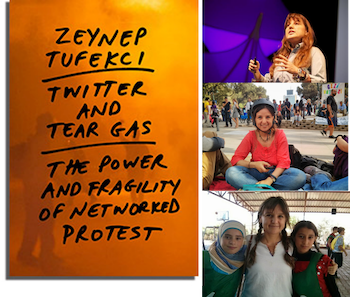22nd Annual Social Justice Colloquium Welcomes Zeynep Tufekci
On Thursday, November 9, 2017, CAHSS departments joined together with campus partners on the School of Social Behavioral and Global Studies 22nd Annual Social Justice Colloquium, led by CSUMB founding faculty member Gerald Shenk. This year's event featured a keynote address, panel discussion and book signing with Zeynep Tufekci, author of Twitter and Tear Gas: The Power and Fragility of Networked Protest.

Since April of 1997, the annual Social Justice Colloquium has provided an opportunity for our students, faculty, staff and local community members to explore critical issues of social justice in their contemporary, historical, local, and global contexts. The Colloquium seeks to build and maintain bridges between the academic community at CSUMB and the broader community which it serves, erasing the artificial line between what is academic and the non-academic worlds we all inhabit.
The event featured a reception and TED videos, followed by a welcome by Provost Bonnie Irwin and CAHSS Dean Ilene Feinman. The keynote address led to a panel discussion featuring Rebecca Caladiano, Students for Quality Education at CSUMB; Bradley Zeve, Monterey County Weekly, and George Station, CSUMB Faculty. The event concluded with a book signing in the lobby of University Center.
About the Speaker: Zeynep Tufekci
Dr. Tufekci is Associate Professor in the School of Information and Library Science, an adjunct professor of sociology at the University of North Carolina and a faculty associate at the Harvard Berkman Klein Center for Internet and Society.
Dr. Tufekci is a veteran of multiple protest movements that owe much of their power, as well as vulnerability, to social media such as Facebook, Twitter, and Instagram. These movements included Gezi Park in Turkey, the Tahrir Square/Arab Spring protests in Egypt, and the Occupy Movement in the U.S. She has deep connections with leaders of the revolution that brought down the Tunisian dictator, Sine El Abidine Ben Ali. Professor Tufekci’s personal experiences in these movements, in conjunction with the serious scholarship reflected in her recent book, Twitter and Tear Gas, have given her invaluable insights into both the advantages, disadvantages and dangers of increasing dependence upon social media by protest movements, as well as by governments or government officials.
She addresses the increasing power of social media through the “magic” of algorithms, from Facebook and Twitter, to Google and Amazon, not only over the course of social movements and governmental responses, but over the everyday lives of people everywhere.
Media Coverage:
With Our Thanks:
This event is made possible through contributions from: The offices of the CSUMB President and Provost, CSUMB Special Events, The College of Arts, Humanities, and Social Sciences, University College, California Faculty Association, School of Social, Behavioral, & Global Studies, School of Humanities & Communication, the Psychology Department, School of Computing and Design, the Department of Visual & Public Art, The Service Learning Institute, and First Year Seminar.
Event organizers: Rachel FitzJohn (Office Administrator, Social, Behavioral & Global Studies), Gerald Shenk (Professor of History), Angie Tran (Professor of Political Economy), George Station (Lecturer, First Year Seminar), Mrinal Sinha (Associate Professor of Psychology), Estella Porras (Associate Professor of Journalism and Human Communication), Angelica Muro (Chair & Assistant Professor of Visual and Public Art).
The School of Social, Behavioral and Global Studies houses two majors, Global Studies and Social & Behavioral Sciences, providing an integrative approach to the fields of anthropology, archaeology, economics, geography, history, international studies, Native American studies, political science, religious studies and sociology.
The College of Arts, Humanities, and Social Sciences empowers students to critically examine their place in the world: to imagine, to communicate, to collaborate, to create, and to transform. Our graduates are engaged global citizens ready for the realities of the 21st century.